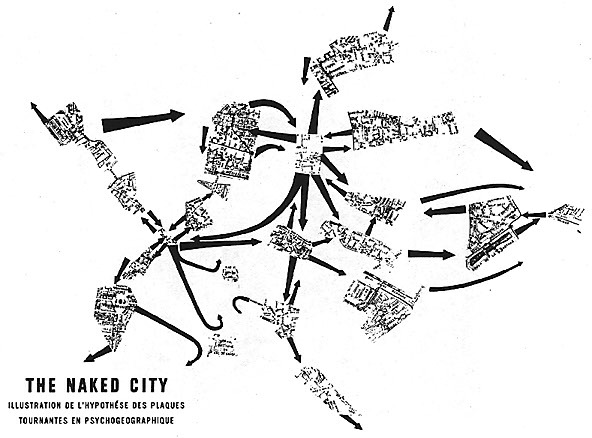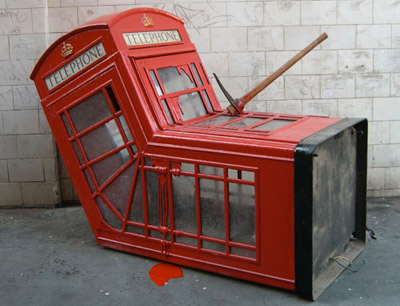Situationist International
A collection of avante-garde artist groups working in the late 1950's and 1960's. Their ideas were rooted in revolutionary ideals and avante-garde experimental art. Their work also explored alternate viewings of the city (unitary urbanism, the derive, psychogeography) and influenced countercultures including culture-jammers and punks.
Background
History:
Founded 1957, fused several avant-garde European artist groups, Guy Debord as de-facto leader
Unstable membership
May 1968 protests, largest general strike ever. A political failure, but had a large social impact. SI heavily involved in the Occupation of the Sorbonne
Dissolved in 1972
Characters:
Guy Debord - writer, filmmaker, Marxist, former member of Lettrist International
Asger Jorn – Danish artists, founder of the Scandinavian Institute of Comparative Vandalism
Constant Nieuwenhuys – Dutch painter, creator of New Babylon utopia
Ivan Chtcheglov - French activist. Wrote Formulary for New Urbanism when he was 19. Plotted to blow up the Eiffel Tower because its lights kept him up at night. Committed to a mental asylum for five years.
Themes:
Critique of art and urban space
Anti-Society of the Spectacle (commodification, capitalist consumption ) in favor of directly-lived experiences
Art as a political act - they were interested in cultivating political activism through their art
Unitary Urbanism – urbanism of the unpredictable, participation, and desire. A rethinking of cities based on participation and interaction.
Psychogeography – a study of the city based on emotions and behavior of individuals. Urban navigation independent of the predominant patterns of circulation. A social geography of the city
Derive – spontaneous exploration of the city, encountering an entirely new experience. A “drift” through the city without destination. Cutting freely across the city, one would gain revolutionary perception of urban space; drifts were radical re-readings of the city. Debord recommended drifting for a day, or even smaller periods of time. while Chtcheglov looked forward to a society 'where the principle activity is continual drift.'
Detournement – situationist pranks that “turned expressions of the capitalist system against itself,” inspiration for culture-jamming
“ordinary people should make everyday art” - Guy Debord

Influence:
Culture-jamming - subverting mainstream culture of material consumption. Turning "expressions of the capitalist system agianst itself"
http://www.adbusters.org/ - ADBUSTERS - Culturejamming Headquarters - Adbusters called for the initial Occupation of Wallstreet
Street art and billboard altering - artists such as Ron English and Banksy http://www.banksy.co.uk/


Constant's New Babylon
http://lebbeuswoods.wordpress.com/2009/10/19/constant-vision/


http://boiteaoutils.blogspot.com/2010/03/constants-new-babylon-drawings.html
Resources:
Situationist International Online, an archive published by the Center for Digital Discourse and Culture @ Virginia Tech
http://www.cddc.vt.edu/sionline/index.html
17 May 1960
reprinted in Internationale Situationniste #4 (June 1960)
Translated by Fabian Thompsett
THE EXISTING FRAMEWORK cannot subdue the new human force that is increasing day by day alongside the irresistible development of technology and the dissatisfaction of its possible uses in our senseless social life.
Alienation and oppression in this society cannot be distributed amongst a range of variants, but only rejected en bloc with this very society. All real progress has clearly been suspended until the revolutionary solution of the present multiform crisis.
What are the organizational perspectives of life in a society which authentically "reorganizes production on the basis of the free and equal association of the producers"? Work would more and more be reduced as an exterior necessity through the automation of production and the socialization of vital goods, which would finally give complete liberty to the individual. Thus liberated from all economic responsibility, liberated from all the debts and responsibilities from the past and other people, humankind will exude a new surplus value, incalculable in money because it would be impossible to reduce it to the measure of waged work. The guarantee of the liberty of each and of all is in the value of the game, of life freely constructed. The exercise of this ludic recreation is the framework of the only guaranteed equality with non-exploitation of man by man. The liberation of the game, its creative autonomy, supersedes the ancient division between imposed work and passive leisure.
The church has already burnt the so-called witches to repress the primitive ludic tendencies conserved in popular festivities. Under the existing dominant society, which produces the miserable pseudo-games of non-participation, a true artistic activity is necessarily classed as criminality. It is semi-clandestine. It appears in the form of scandal.
So what really is the situation? It's the realization of a better game, which more exactly is provoked by the human presence. The revolutionary gamesters of all countries can be united in the S.I. to commence the emergence from the prehistory of daily life.
Henceforth, we propose an autonomous organization of the producers of the new culture, independent of the political and union organizations which currently exist, as we dispute their capacity to organize anything other than the management of that which already exists.
From the moment when this organization leaves the initial experimental stage for its first public campaign, the most urgent objective we have ascribed to it is the seizure of U.N.E.S.C.O. United at a world level, the bureaucratization of art and all culture is a new phenomenon which expresses the deep inter-relationship of the social systems co-existing in the world on the basis of eclectic conservation and the reproduction of the past. The riposte of the revolutionary artists to these new conditions must be a new type of action. As the very existence of this managerial concentration of culture, located in a single building, favors a seizure by way of putsch; and as the institution is completely destitute of any sensible usage outside our subversive perspective, we find our seizure of this apparatus justified before our contemporaries. And we will have it. We are resolved to take over U.N.E.S.C.O., even if only for a short time, as we are sure we would quickly carry out work which would prove most significant in the clarification of a long series of demands.
What would be the principle characteristics of the new culture and how would it compare with ancient art?
Against the spectacle, the realized situationist culture introduces total participation.
Against preserved art, it is the organization of the directly lived moment.
Against particularized art, it will be a global practice with a bearing, each moment, on all the usable elements. Naturally this would tend to collective production which would be without doubt anonymous (at least to the extent where the works are no longer stocked as commodities, this culture will not be dominated by the need to leave traces.) The minimum proposals of these experiences will be a revolution in behavior and a dynamic unitary urbanism capable of extension to the entire planet, and of being further extensible to all habitable planets.
Against unilateral art, situationist culture will be an art of dialogue, an art of interaction. Today artists — with all culture visible — have been completely separated from society, just as they are separated from each other by competition. But faced with this impasse of capitalism, art has remained essentially unilateral in response. This enclosed era of primitivism must be superseded by complete communication.
At a higher stage, everyone will become an artist, i.e., inseparably a producer-consumer of total culture creation, which will help the rapid dissolution of the linear criteria of novelty. Everyone will be a situationist so to speak, with a multidimensional inflation of tendencies, experiences, or radically different "schools" — not successively, but simultaneously.
We will inaugurate what will historically be the last of the crafts. The role of amateur-professional situationist — of anti-specialist — is again a specialization up to the point of economic and mental abundance, when everyone becomes an "artist," in the sense that the artists have not attained the construction of their own life. However, the last craft of history is so close to the society without a permanent division of labor, that when it appeared amongst the SI, its status as a craft was generally denied.
To those who don't understand us properly, we say with an irreducible scorn: "The situationists of which you believe yourselves perhaps to be the judges, will one day judge you. We await the turning point which is the inevitable liquidation of the world of privation, in all its forms. Such are our goals, and these will be the future goals of humanity."
Comments (0)
You don't have permission to comment on this page.